25 Jun2020
By AACTE

AACTE celebrates the recent rulings of the Supreme Court of the United States (SCOTUS) in support of the LGBTQ community and the Deferred Action for Childhood Arrivals (DACA) program. AACTE commends the two decisions and their significant impact for growing a diversified educator workforce prepared by AACTE member institutions to meet the needs of diverse learners.
For the first time in American schools, LGBTQ teachers will not fear the loss of employment when self-identifying thanks to the SCOTUS June 15 ruling. It affirms the 1964 Civil Rights Act protects gay, lesbian, and transgender employees from discrimination based on sex. AACTE believes representation of LGBTQ educators in schools is vital to the mental and physical health of LGBTQ students, particularly Black transgender youth. The SCOTUS decision will increase the visibility of gender diverse teachers on all levels of the education system and will help students gain a deeper understanding about the LGBTQ community.
22 Jun2020
By Jacob Easley II
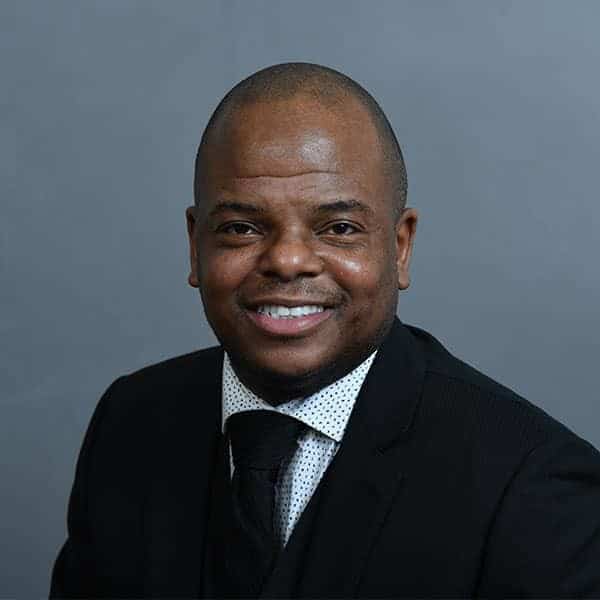 This article originally appeared on the Graduate School of Education at Touro College website and is reprinted with permission.
This article originally appeared on the Graduate School of Education at Touro College website and is reprinted with permission.
To the Touro GSE community, our candidates, and in particular, the youth and children we serve by way of our educator preparation programs, I write to you in solidarity with the many educators across the United States who collectively speak out against the horrific brutality and the death of George Floyd and many others. The world is watching. These are indeed troubling times coupled with the COVID-19 pandemic.
Our president of Touro College and University System, Dr. Alan Kadish has led the charge for those of us within the Touro academy to “Be part of the solution.” To our Black and brown youth, our first desire is your safety and to let you know you are valued. This too we hold dear for all communities of color. Yet, desires without actions are delusions. We must also move beyond rhetoric and engage the tools of professional educators. This we must and will continue to do as researchers, practitioners, and advocates focusing on educational equity.
18 Jun2020
By Chris Godwin
 The Executive Board of NCACTE grieves with the nation and joins in solidarity with our black brothers and sisters during this tragic period in our nation’s history. Systemic racism stole the lives of George Floyd, Rayshard Brooks, Ahmaud Arbery, Breonna Taylor, Eric Garner, Trayvon Martin, Michael Brown, and many more that are not named here. As teacher educators, we believe Black Lives Matter and we see the impact of racism in both our K-12 schools, colleges and universities. As a body, we agree students in our schools need and deserve antiracist teachers as well as teachers who are mirrors for themselves. This statement is our initial commitment to action, which will begin months and years of work ahead. We are also committed to finding the right people to lead this work for and with us.
The Executive Board of NCACTE grieves with the nation and joins in solidarity with our black brothers and sisters during this tragic period in our nation’s history. Systemic racism stole the lives of George Floyd, Rayshard Brooks, Ahmaud Arbery, Breonna Taylor, Eric Garner, Trayvon Martin, Michael Brown, and many more that are not named here. As teacher educators, we believe Black Lives Matter and we see the impact of racism in both our K-12 schools, colleges and universities. As a body, we agree students in our schools need and deserve antiracist teachers as well as teachers who are mirrors for themselves. This statement is our initial commitment to action, which will begin months and years of work ahead. We are also committed to finding the right people to lead this work for and with us.
Each moment defines us, and this moment calls us to stand up and call for justice. As Dr. Pamela Senegal, President of Piedmont Community College states, “The fact of the matter is this in the United States—race still matters far too much in nearly every aspect of living. Housing. Credit. Education. Prison. Jail. Health.”
18 Jun2020
By Andrew Daire
This article originally appeared on the School of Education at Virginia Commonwealth University website and is reprinted with permission.
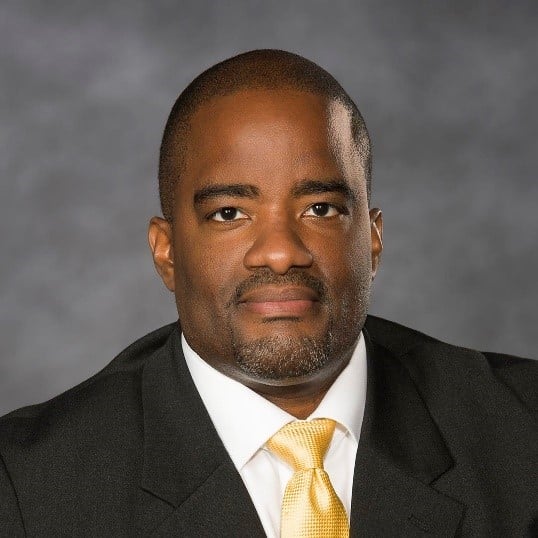 The VCU School of Education wishes to express our solidarity with the recent anti-racist protests and efforts to eradicate structural and systemic racism that began after the brutal murder of George Floyd in Minneapolis by police officers. His murder is not just a recent upsetting event, as so many other incidents come to mind: Amy Cooper in New York calling the police with false allegations regarding a black man; Ahmad Aubrey who was shot to death by Gregory and Travis McMichael; Breonna Taylor who was killed by police raiding her home; Eric Garner, and on and on and on. These incidents, and many more, are part of a pattern of ongoing, systemic, racist behavior against black people in this country since the beginning of slavery. Additionally, efforts to eradicate structural and systemic racism must continue. The grief that people of color are experiencing goes well beyond these recent events but is historical grief, exacerbated by these events.
The VCU School of Education wishes to express our solidarity with the recent anti-racist protests and efforts to eradicate structural and systemic racism that began after the brutal murder of George Floyd in Minneapolis by police officers. His murder is not just a recent upsetting event, as so many other incidents come to mind: Amy Cooper in New York calling the police with false allegations regarding a black man; Ahmad Aubrey who was shot to death by Gregory and Travis McMichael; Breonna Taylor who was killed by police raiding her home; Eric Garner, and on and on and on. These incidents, and many more, are part of a pattern of ongoing, systemic, racist behavior against black people in this country since the beginning of slavery. Additionally, efforts to eradicate structural and systemic racism must continue. The grief that people of color are experiencing goes well beyond these recent events but is historical grief, exacerbated by these events.
We will support this movement with not just words, but actions.
16 Jun2020
By Jane E. West
 This blog post is written by AACTE consultant Jane West and is intended to provide updated information. The views expressed in this post do not necessarily reflect the views of AACTE.
This blog post is written by AACTE consultant Jane West and is intended to provide updated information. The views expressed in this post do not necessarily reflect the views of AACTE.
Police Reform in the Wake of George Floyd’s Death: Is it Coming? How Will it Affect Schools?
The purview of state and local government police reform is rapidly moving into the realm of the federal government. House Democrats have acted quickly, introducing a sweeping bill, the Justice in Policing Act of 2020 with 200 sponsors. Republicans in both the House and Senate are feeling the pressure and discussions are underway, albeit for a far more limited approach. The White House is sending mixed messages, on the one hand calling for reform and on the other, calling for law and order.
Sen. Tim Scott (R-SC) is taking the lead for Republicans in the Senate and has been in conversation with the White House. Rep. Jim Jordan (R-OH), a top Trump ally in the House, said he will release his own plan shortly. Senate proposals appear to feature the improvement of federal data collection on the use of force and no-knock warrants as well as police training. White House spokespersons said that ending qualified immunity, which protects police officers from civil lawsuits, was a nonstarter.
16 Jun2020
By Lynn M. Gangone
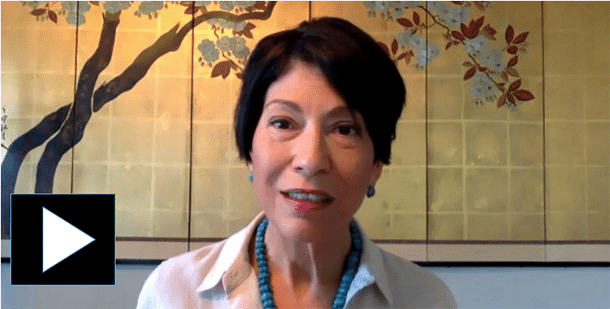
We are indeed living in profound times. Educators face extraordinary challenges navigating not only the global health crisis, but also the racial and systemic injustices occurring within our country. AACTE and its Board of Directors are taking bold actions to augment our leading role during this time of change. Please take a few minutes to watch the video above and learn more.
Educators must remain committed to teaching and modeling social responsibility now more than ever before. Stay connected with AACTE for the latest resources, tools, and information to address the issues facing our profession today. Visit aacte.org to access these benefits and renew your AACTE membership.
15 Jun2020
By Linda Darling-Hammond and Janel George
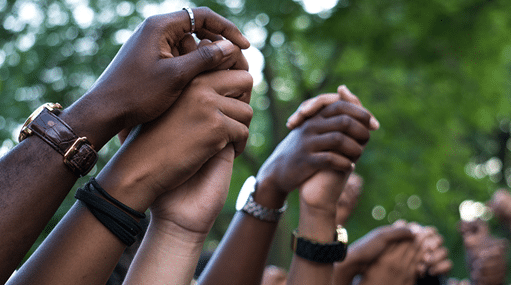
This article originally appeared on the Learning Policy Institute Blog and is reprinted with permission.
The protests now enveloping our nation are, in one sense, long overdue. The recent police killings of George Floyd, Breonna Taylor, and Tony McDade are not isolated incidents: Every year in the United States, more than 1,000 civilians are killed by police, and Black people are disproportionately harmed. These murders and the lack of justice that has routinely accompanied them are, in turn, part of a pattern of institutionalized racism that limits the opportunities of African Americans and other people of color in every aspect of society: employment, housing, health care, and, yes, education.
09 Jun2020
By Jane E. West
 This blog post is written by AACTE consultant Jane West and is intended to provide updated information. The views expressed in this post do not necessarily reflect the views of AACTE.
This blog post is written by AACTE consultant Jane West and is intended to provide updated information. The views expressed in this post do not necessarily reflect the views of AACTE.
Educators Step Up for Racial Justice
Educators are responding to the killing of George Floyd and the racism it highlights by stepping up with a variety of initiatives and a renewed sense of urgency. Both the University of Minnesota and the Minnesota Public Schools have cut their ties with the Minneapolis Police Department.
The National Association of Secondary School Principals (NASSP) is urging school leaders to address racial disparities in discipline policies and the use of resource officers in response to the George Floyd killing and subsequent events.
The Leadership Conference on Civil and Human Rights and 400 other organizations, including both teachers’ unions, issued a letter calling on Congress to pass police reform legislation. They urge changes in areas including the use of force, policy accountability, racial profiling, militarization, data collection, and training.
04 Jun2020
By AACTE
On behalf of the American Association of Colleges for Teacher Education (AACTE) Board of Directors, Chair Ann Larson issued the following statement today on race matters in America:
“AACTE leaders are compelled to voice our dissent of the recent, tragic events that have resulted in the horrendous murders of Black Americans. The unjust deaths of George Floyd, Ahmaud Arbery, Breonna Taylor, and many others represent incendiary racism that has deep, historic roots in our society. This profound moment in time has brought despair not only to the Black American community, but also to innumerable individuals, families, and communities representing legions of cultures and ethnicities throughout the country and the world. In the words of Dr. Martin Luther King Jr., ‘Injustice anywhere is a threat to justice everywhere. We are caught in an inescapable network of mutuality, tied in a single garment of destiny. Whatever affects one directly, affects all indirectly.’
It is imperative that educators embrace their responsibility as front line workers in dismantling structural racism within the American education system. Schools play a critical role in educating students about citizenship and societal values, which have long perpetuated the cycle of racial injustice. Educators must be change agents for reversing the miseducation of white people about black and brown people, and for promoting racial equity. There is a critical need for well-prepared, culturally responsive teachers who can educate and guide learners to value the lives of all human beings and hold others accountable in practicing justice, ensuring equitable access, promoting and assuring diversity, fostering inclusive policies and practices in all aspects of our society, and offering hope and optimism to all children.
02 Jun2020
By AACTE
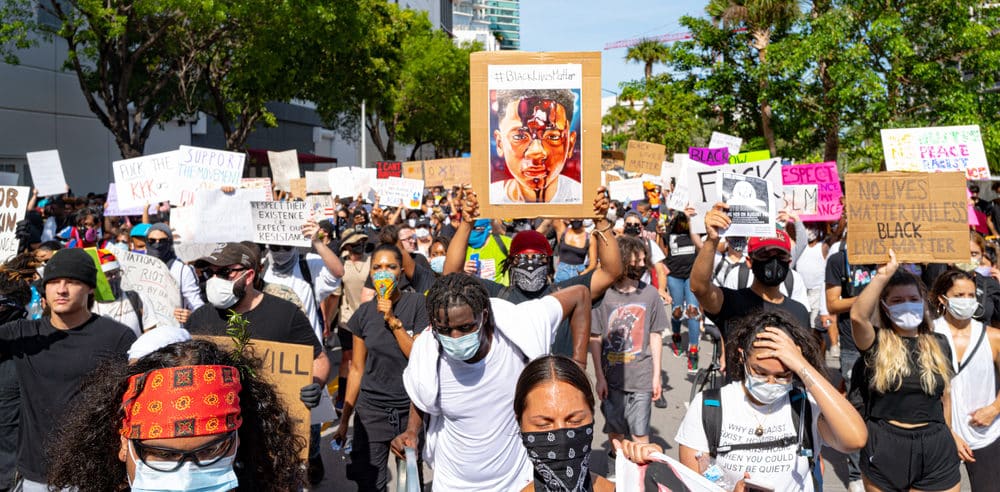
On behalf of the American Association of Colleges for Teacher Education (AACTE), President and CEO Lynn M. Gangone issued the following statement today responding to the killing of George Floyd and systemic racism:
“AACTE acknowledges an insidious threat to the foundation of American democracy—institutional and structural racism. The construct of racism in our country is rooted in the historical, systemic abuse of power, based upon white supremist ideologies, and resulting in white privilege. Racism has long been entrenched in American institutions and policies that reinforce an unjust and disparate allocation of rights and resources to white people, while disallowing them to Black and other people of color—including our institutions of learning.
AACTE is outraged over the recent videos of Amy Cooper weaponizing the police against Chris Cooper in New York City’s Central Park, George Floyd’s murder by a Minneapolis police officer, and the hunting and killing of Ahmaud Aubery by men with ties to their local Georgia police department, as well as the murder of Breonna Taylor by police while sleeping in her home. The latter events represent only a few of the string of killings of Black citizens at the hands of white perpetrators and law enforcement. In each case, the victims were unarmed. In each case, the Black community was forced to mobilize, call out the racist crime, and demand justice that has yet to be realized.
01 Jun2020
By JTE Insider
Check out a recent JTE Insider podcast by the Journal of Teacher Education (JTE) editorial team. This blog is available to the public, and AACTE members have free access to the articles in the JTE online archives—just log in with your AACTE profile.
In this edition of JTE Insider, we are joined by Loraine McKay and Heather Manning from Griffith University (Australia). They are the authors of the article entitled “Do I Belong in the Profession? The Cost of Fitting In As a Preservice Teacher With a Passion for Social Justice” The article is published in the September/October 2019 issue of JTE.
Loraine McKay is a senior lecturer at Griffith University. She teaches into the Bachelor of Education program. She is currently first year coordinator in the Bachelor of Education program and professional experience individual case coordinator. McKay’s research interests align strongly with her passion for teaching. She was a classroom teacher for over 20 years in the primary education sector before leaving teaching to complete her doctoral studies. Her current research centers on developing teacher identity, efficacy, and resilience in preservice teachers. Loraine is particularly interested in preparing teachers to work in inclusive classrooms. She uses collage and photo elicitation to explore the affective dimension of teaching and engagement in learning.
24 Apr2020
By Renée A. Middleton
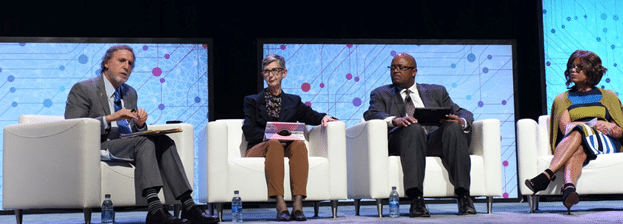
On Feb. 29, my colleagues and I had the honor of delivering the Deeper Dive presentation, “Combating Discrimination and Hatred Through Education,” at AACTE’s 72nd Annual Meeting in Atlanta. This experience was a wonderful opportunity to help deans of education and other educational leaders understand the important role that they play—not only in shaping curriculum, but also in making the world a better place.
Hate exists because people do not understand each other and want to “other-ize.” Well, the most effective way to eliminate hate is through education, and I believe the Deeper Dive presentation underscored that message.
I, along with Rick Ginsberg (University of Kansas), Marvin Lynn (Portland State University), Margaret Grogan (Chapman University), and David Machlis (Adelphi University). presented about the Holocaust—how it happened, why it happened, and how educators should approach this type of subject matter in schools. Connecting the past to the present is not always easy, but it is imperative to prepare students to be active and informed citizens.
15 Apr2020
By Carole Basile
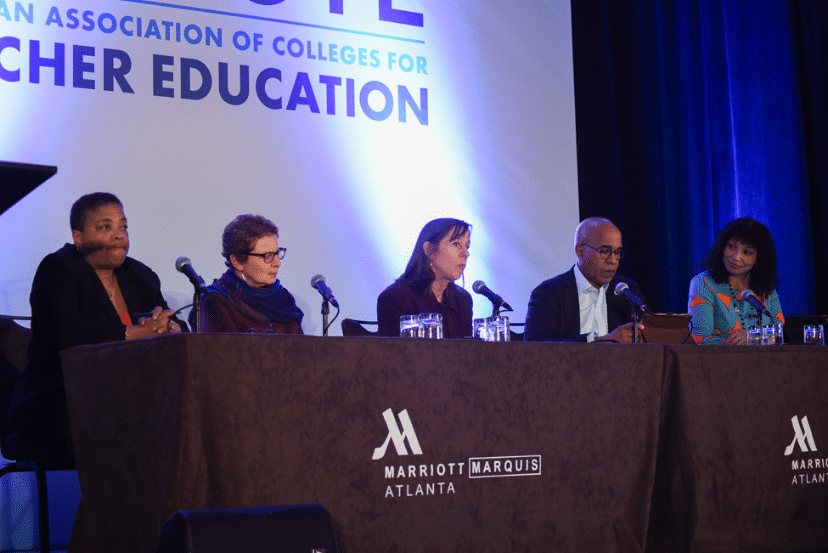
During the AACTE 2020 Annual Meeting in Atlanta, I had the pleasure of serving on the panel of the “Disruptive Deans” Deeper Dive Session along with three fellow deans. Our challenges are disrupting the one-teacher one-classroom model, closing the uneven admissions pathways between community colleges and 4-year institutions, breaking the traditional mindsets of hiring practices, and questioning the biases of traditional learning environments. These are no small tasks.
During the Disruptive Deans Deeper Dive session, the panel covered the following topics:
- “Building the next education workforce”—(I presented this topic.)
- “Designing a clear transfer model in the state of Oregon for community college transfer and increasing the number of teachers of color and bilingual students,” presented by Cecilia Monto, dean, Education and Humanities, Chemeketa Community College.
- “Hiring and retaining faculty of color,” presented by Don Pope-Davis, dean, College of Education and Human Ecology, The Ohio State University
- “Promoting understanding of the social justice imperative of educating teachers to educate all learners including those who are neuro-divergent,” presented by Kimberly White-Smith, dean, LaFetra College of Education, University of La Verne
Our moderator, (also a disruptor) Wanda J. Blanchett, dean, Rutgers University, has led a distinguished career promoting equity and inclusion for all.
16 Mar2020
By AACTE
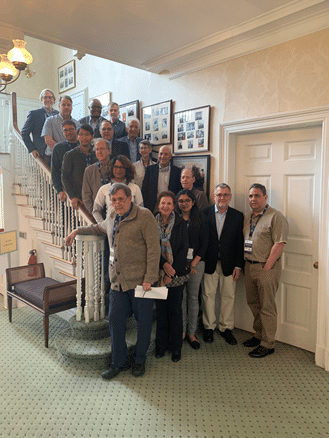 An excerpt from this article appeared in District Administration on March 11.
An excerpt from this article appeared in District Administration on March 11.
Today, we live in a society where truth is decaying, falsehoods are readily shared across social media, and hatred and discrimination are on the rise. According to the Southern Poverty Law Center the number of hate groups operating in the United States hit a record high in 2018. Hate speech creates an environment in which biases and discrimination thrive and can have a detrimental impact on a school’s culture and climate. Teaching and learning about the roots of hate are important elements in fostering an inclusive classroom environment.
Teachers play an essential role in creating a more humane and tolerant world. They are stewards of culture and are in a position to protect history, promote facts and prevent inhumanity. However, to provide students with the most effective instruction, educators must have the tools to understand the nature of hate crimes and how they impact the culture and climate of schools where they teach. Additionally, they must know how to address issues of bias and discrimination in the classroom.
26 Feb2020
By Kimberly White Smith

The American education system was not created to support the liberation of the powerless. Instead, it was designed to instill skills, habits, beliefs, and discipline that would allow for better control of the masses. The colonizers who became the architects of this country built a system that perpetuates the status of white-skinned privilege and wealth, while leaving those in the lower and middle classes burdened with the laborious task of building and supporting our nation’s economy and infrastructure.
Throughout the history of the United States, minoritized racial groups and those who live in poverty have suffered disparities in education through laws and policies that prohibited them from socioeconomic advancement, physical safety, and basic civil rights. The anti-literacy laws enacted before, during, and after the Civil War are just one example of how white-skinned privilege and power was used to perpetuate the oppression of enslaved Blacks and concretize a system that generated more wealth for those in power.
Our current education system continues to enable inequity through policies and practices that claim to be fair, colorblind, and neutral, but tend to privilege a small, elite portion of the U.S. population. We can no longer live by the adage “pull yourself up by your bootstraps,” when those who deserve a better education continue to be plagued by disparities. Addressing the persistent opportunity gap between our nation’s socioeconomic classes requires sustained engagement from leaders across every field of education.








 This article originally appeared on the Graduate School of Education at Touro College
This article originally appeared on the Graduate School of Education at Touro College  The Executive Board of NCACTE grieves with the nation and joins in solidarity with our black brothers and sisters during this tragic period in our nation’s history. Systemic racism stole the lives of George Floyd, Rayshard Brooks, Ahmaud Arbery, Breonna Taylor, Eric Garner, Trayvon Martin, Michael Brown, and many more that are not named here. As teacher educators, we believe Black Lives Matter and we see the impact of racism in both our K-12 schools, colleges and universities. As a body, we agree students in our schools need and deserve antiracist teachers as well as teachers who are mirrors for themselves. This statement is our initial commitment to action, which will begin months and years of work ahead. We are also committed to finding the right people to lead this work for and with us.
The Executive Board of NCACTE grieves with the nation and joins in solidarity with our black brothers and sisters during this tragic period in our nation’s history. Systemic racism stole the lives of George Floyd, Rayshard Brooks, Ahmaud Arbery, Breonna Taylor, Eric Garner, Trayvon Martin, Michael Brown, and many more that are not named here. As teacher educators, we believe Black Lives Matter and we see the impact of racism in both our K-12 schools, colleges and universities. As a body, we agree students in our schools need and deserve antiracist teachers as well as teachers who are mirrors for themselves. This statement is our initial commitment to action, which will begin months and years of work ahead. We are also committed to finding the right people to lead this work for and with us.  The VCU School of Education wishes to express our solidarity with the recent anti-racist protests and efforts to eradicate structural and systemic racism that began after the brutal murder of George Floyd in Minneapolis by police officers. His murder is not just a recent upsetting event, as so many other incidents come to mind: Amy Cooper in New York calling the police with false allegations regarding a black man; Ahmad Aubrey who was shot to death by Gregory and Travis McMichael; Breonna Taylor who was killed by police raiding her home; Eric Garner, and on and on and on. These incidents, and many more, are part of a pattern of ongoing, systemic, racist behavior against black people in this country since the beginning of slavery. Additionally, efforts to eradicate structural and systemic racism must continue. The grief that people of color are experiencing goes well beyond these recent events but is historical grief, exacerbated by these events.
The VCU School of Education wishes to express our solidarity with the recent anti-racist protests and efforts to eradicate structural and systemic racism that began after the brutal murder of George Floyd in Minneapolis by police officers. His murder is not just a recent upsetting event, as so many other incidents come to mind: Amy Cooper in New York calling the police with false allegations regarding a black man; Ahmad Aubrey who was shot to death by Gregory and Travis McMichael; Breonna Taylor who was killed by police raiding her home; Eric Garner, and on and on and on. These incidents, and many more, are part of a pattern of ongoing, systemic, racist behavior against black people in this country since the beginning of slavery. Additionally, efforts to eradicate structural and systemic racism must continue. The grief that people of color are experiencing goes well beyond these recent events but is historical grief, exacerbated by these events. This blog post is written by AACTE consultant Jane West and is intended to provide updated information. The views expressed in this post do not necessarily reflect the views of AACTE.
This blog post is written by AACTE consultant Jane West and is intended to provide updated information. The views expressed in this post do not necessarily reflect the views of AACTE.

 This blog post is written by AACTE consultant Jane West and is intended to provide updated information. The views expressed in this post do not necessarily reflect the views of AACTE.
This blog post is written by AACTE consultant Jane West and is intended to provide updated information. The views expressed in this post do not necessarily reflect the views of AACTE.


 An excerpt from this article appeared in
An excerpt from this article appeared in 